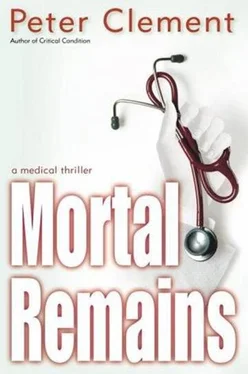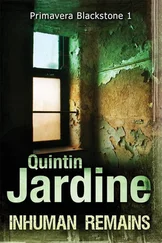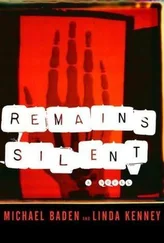They neared Victor’s pièce de résistance, the section where they did the DNA analyses. Located in an area behind glass windows that could only be accessed through an airlock, some of the machinery looked similar to the other equipment they’d seen, but many pieces were right out of Star Trek , and workers inside wore protective clothing.
“Just like in making CDs, we keep a dust-free environment to reduce the risk of contaminating specimens,” Victor explained. “We have a dozen PCR machines, and three dozen electrophoresis units…”
As Victor expounded on the technology of breaking down DNA and separating out specific genes for identification, Mark noticed a change since he’d last been corralled into a tour. There were far more people working in this unit than he remembered, and now it was after hours. “Business must be good as far as the DNA department goes,” he said jokingly, as they returned to the front entrance.
“Booming,” replied Victor in complete earnestness. “We’re even testing for genes that don’t have a confirmed link to diseases yet, but may be a potential risk.”
“Who wants that information?” Lucy asked.
He shrugged. “The New York corporations that have contracts with us. Seems particularly to be the new wave in executive health plans. And, of course, research labs. But we figure the real up-and-coming market will be aging baby boomers who want to know if they’ve got the gene that killed Mom or Dad. Screening for the mutations linked to breast and ovarian cancer, colon cancer, Alzheimer’s – you name it. Real cutting-edge stuff…”
Mark cringed as Victor talked. Unfortunately, his prediction had already begun to materialize. Recently a chain of stores better known for selling soaps and shampoos began to market an expensive screening test to detect genetic defects linked to breast and ovarian cancer, placing the devices on display alongside bath oils and bubble beads. And last month his patients started to bring in magazines normally associated with tips for beautiful homes and fine gardens that now carried ads urging readers to get genetically tuned in to what they should eat and drink by screening for disorders affected by diet. The trouble was, not everyone who has a genetic defect will go on to develop the disease they are at risk for, and at this stage of the game, no one could pick the winners from the losers. Rampant commercialization of the technology would lead to widespread, fruitless, and potentially harmful anxiety, while places like Nucleus Laboratories made a pile of money telling healthy Americans that they were sick. He and Victor had already had heated debates over the issue. But this was Victor’s moment in the sun with Lucy, so Mark held his peace.
As she drove the car out of the driveway, Lucy asked, “Is Victor a friend?”
“Actually, he’s a patient.”
“Really? I took you for friends. But around you it’s hard to tell the difference.”
“How do you mean?”
“You have a really nice way with patients. A lot of the people who were in your office today consider you both friend and physician.”
“And how do you know that?”
“They told me so. It was neat to hear.”
“Sometimes it makes the job harder.”
“You mean staying objective-”
“That’s difficult enough. What I’m talking about makes being friends impossible.”
“Oh?”
“People tell me almost everything that’s personal and private, as they do most doctors. But in a place like Hampton Junction, I end up knowing both who’s got the secrets and who the secrets are kept from.”
“What?”
“Just the other day I was sitting in my office with a woman who sees me regularly for stress and a nervous stomach. The reason for her problems – she’s afraid her husband is running around on her. We were interrupted by a phone call from a woman whom I’m treating for depression because the man she loves, that very same husband, won’t leave his wife. They don’t teach you how to manage that kind of situation in New York.”
She gave an appreciative whistle. “Does it happen a lot?”
“Often enough. You’ll probably go through a variation of it while you’re here. After all, you’re a fresh audience, so people will definitely let you in on the seamier sides of life in Hampton Junction.”
She glanced sideways at him.
“Relax,” he added. “It won’t be that bad.”
She smiled, but drove without saying anything. A few minutes later, she asked, “Show me Kelly’s house?”
“Her old family home? It’s long gone. Her parents sold off and moved back to New York after she disappeared.”
“No. I meant where she lived with Chaz Braden.”
“Sure. It’s not far from here.”
She followed his instructions, heading in the direction of Saratoga Springs. After a few miles the thick forest gave way to a floodlit, rolling, snow-covered lawn surrounded by white fences adjacent to a lake. Ablaze with light and well back from the road stood a layered house with several wings emanating from a peaked center, the whole structure wrapped in a veranda. As a young boy passing by with his parents, it had always reminded him of a gilded bird trying to take flight. “Here it is. Rural chic of the pretend horsy set. Paddock style on the front yard, but nary a nag in sight.”
She said nothing, but slowed as they passed the large wrought-iron gate that guarded the entrance. In the parking lot at the end of a quarter-mile driveway, a dozen limousines glittered like a nest of black beetles.
“That’s odd,” Mark said. “Old man Braden must be up for Thanksgiving this year. He usually doesn’t show until Christmas.”
“He’s brought a lot of friends.”
“When here, he’s always having parties. Not that I’m on his guest list. Was, when I was a kid. My father used to get invited. I think that was Kelly’s doing. I learned much later from my aunt that Mom hated going and thought the rest of them acted superior to Dad. But after my mother died, he and I continued to attend, ‘for Kelly’s sake’ I heard him say more than once. Crazy, their looking down on him. Dad was more doctor than both Bradens put together.”
When they got back to Mark’s house, a shiny red Jeep almost identical to his own stood parked in the driveway. The keys and a note from his insurance company advising him that it was only a loaner until they settled his claim had been dropped through the mail slot in his front door. Ride ‘em cowboy, he thought, pocketing the keys.
“Could I take a look at your father’s file on Kelly?” Lucy asked after supper.
“Sure.” He got it out for her.
Having leafed through the contents at the kitchen table, she came to the newspaper clippings on the Braden’s charitable works. “What are these doing here?”
“I’ve no idea. My father kept them there. He also collected a pile of statistics on those two places, but for the life of me I can’t figure out what he was after.”
“Could I see them as well?”
Two hours later, papers spread out in front of her, on chairs, even over the countertops, she continued to pore over the data that had defeated him.
“Any luck?” he asked, standing in the doorway watching her.
“Oh?” she started, obviously surprised by his voice. “No, I mean I can’t see anything glaringly wrong.”
“Well, I’m heading up to bed. It’ll be a big day tomorrow, everybody calling in to get tuned up for Thanksgiving.”
“I’m going to work a while longer.”
“Good night.”
“Good night, Mark.”
Wednesday, November 21,
10:07 A.M.
The Midtown Arms, New York City
Читать дальше












